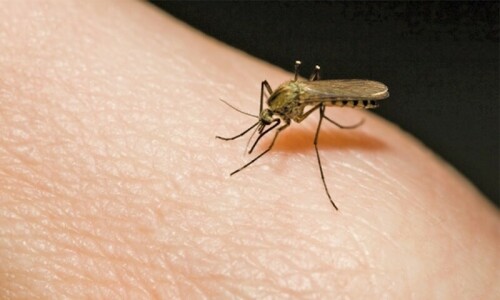ISLAMABAD: The Malaria Control Programme of Pakistan is preparing nine African nations to combat a mosquito that is indigenous to South Asia, potentially causing a sharp rise in malaria cases across the continent.
Following proof that an Indian-origin mosquito, which had been present in the subcontinent for a long time prior to division, had made its way to Africa and was proliferating, the decision was taken.
“Over the past few years, the African continent has seen a rapid spread of the Anopheles stephensi mosquito, which is of Indian origin. This could potentially lead to an increase in malaria cases,” Dr. Muhammad Mukhtar, the chairman of Pakistan’s Directorate of Malaria Control, told Dawn.
It is expected that the new mosquito, which has never been seen on the continent before, could worsen malaria, a disease that already affects 92% of cases worldwide each year.
Even though the mosquito has been present in the subcontinent since before the Partition, he added that the London School of Hygiene’s genome sequencing (DNA testing) of the insect proved that it originated in India and made its way to Africa.
The process of genome sequencing is employed to pinpoint the location or source of viruses and other living creatures. It has been extensively utilized to track down cases of poliovirus reported in Afghanistan and Pakistan and determine the nation of origin of the virus. It can assist in identifying the province or division that the virus is associated with within a nation.
Dr. Mukhtar of the Directorate of Malaria Control stated that Pakistan has been chosen by the Asia Pacific Malaria Elimination Network (APMEN) to train the nine African nations on how to combat the mosquito.
He stated that Pakistan’s selection for the training by the organization’s Vector Control Working Group was an honor for both the Ministry of National Health Services and Pakistan.
The nation’s efforts in “controlling the mosquito over the years” were the reason for the accolade.
There were only 375,000 cases of malaria reported in 2021, he said, but following the floods in 2022, that figure increased to 3.2 million, and it has since begun to decline once more.
He stated that Pakistan’s selection for the training by the organization’s Vector Control Working Group was an honor for both the Ministry of National Health Services and Pakistan.
The nation’s efforts in “controlling the mosquito over the years” were the reason for the accolade.
There were only 375,000 cases of malaria reported in 2021, he said, but following the floods in 2022, that figure increased to 3.2 million, and it has since begun to decline once more.
Dr. Mukhtar claims that Balochistan, Sindh, and the old Fata provinces of Pakistan have been the primary sources of malaria infections. The majority of Punjab’s cases were reported in a few south Punjabi areas.
“We have the experience to train African countries on mosquito control,” Dr. Mukhtar stated. He also mentioned the National Entomological Reference Laboratory in Islamabad, which will be utilized to instruct teams of African countries on policy, strategy, surveillance, and other methods of controlling mosquitoes.
He said that the teams would also be brought to the south Punjabi mosquito breeding grounds for field trips and hands-on training.
Teams from four or five nations will arrive first, with the remaining nations visiting the nation in the second phase.








